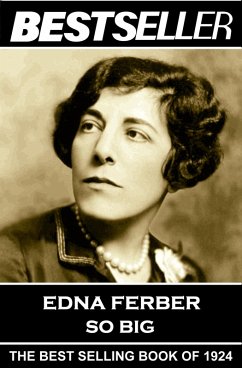Edna Ferber was born on August 15th, 1885, in Kalamazoo, Michigan.
The family moved often due to her father's business failures, likely caused by his early blindness. After living in Chicago, Illinois, came Ottumwa, Iowa with her parents and older sister, Fannie, from ages five to twelve. In Ottumwa, Edna faced and experienced brutal anti-Semitism.
Age 12 Edna and her family moved to Appleton, Wisconsin, where she graduated from high school and briefly attended Lawrence University.
When recovering from anemia, Edna's short stories were compiled and published. From there she took newspaper jobs at the Appleton Daily Crescent and the Milwaukee Journal before publishing her first novel. She also covered both the 1920 Republican National Convention and the 1920 Democratic National Convention for the United Press Association.
Edna was very proud of her Jewish heritage and already in 1922 was troubled by the rise of the Nazi Party and its spreading of anti-Semitic prejudice. Her fears greatly influenced her work, which often featured themes of racial and cultural discrimination.
In 1925, Edna won the coveted Pulitzer Prize for her book 'So Big'. It was made into a silent movie that year and as a talkie in 1932. Edna initially had doubts about the novel, believing it lacked a plot and had a subtle theme that could easily be missed. Her publisher, Doubleday, dismissed her worries. It sold hundreds of thousands of copies of the novel sold to the public. In fact, it became the best-selling title of 1924.
Edna was a keen member of the Algonquin Round Table, a group of wits who met for lunch every day at the New York Hotel in New York. She collaborated with Round Table member George S. Kaufman on several Broadway plays: Minick (1924), The Royal Family (1927), Dinner At Eight (1932), The Land Is Bright (1941), Stage Door (1936), and Bravo! (1948).
When composer Jerome Kern proposed turning her serious 1926 book 'Show Boat' into a musical, Edna wasn't keen on it being a typical lightweight entertainment of the 1920s. Kern explained that he and Oscar Hammerstein II wanted to create a different type of musical. Edna granted him the rights. It changed musical theatre.
Across her career Edna had written some classic and best-selling works either in their own right or as adaptations. Many had received accolades, from the Pulitzer to Oscars. In her personal life though Edna never married and had no children. If there were any relationships, she kept them very quiet. Her outspokenness was usually based on protecting others from insult or putdowns to protect herself. After a man joked that her suit made her resemble a man, she shot back 'So does yours.'
Edna Ferber died at her home in New York City on April 16th, 1968, of stomach cancer, at the age of 82.
The family moved often due to her father's business failures, likely caused by his early blindness. After living in Chicago, Illinois, came Ottumwa, Iowa with her parents and older sister, Fannie, from ages five to twelve. In Ottumwa, Edna faced and experienced brutal anti-Semitism.
Age 12 Edna and her family moved to Appleton, Wisconsin, where she graduated from high school and briefly attended Lawrence University.
When recovering from anemia, Edna's short stories were compiled and published. From there she took newspaper jobs at the Appleton Daily Crescent and the Milwaukee Journal before publishing her first novel. She also covered both the 1920 Republican National Convention and the 1920 Democratic National Convention for the United Press Association.
Edna was very proud of her Jewish heritage and already in 1922 was troubled by the rise of the Nazi Party and its spreading of anti-Semitic prejudice. Her fears greatly influenced her work, which often featured themes of racial and cultural discrimination.
In 1925, Edna won the coveted Pulitzer Prize for her book 'So Big'. It was made into a silent movie that year and as a talkie in 1932. Edna initially had doubts about the novel, believing it lacked a plot and had a subtle theme that could easily be missed. Her publisher, Doubleday, dismissed her worries. It sold hundreds of thousands of copies of the novel sold to the public. In fact, it became the best-selling title of 1924.
Edna was a keen member of the Algonquin Round Table, a group of wits who met for lunch every day at the New York Hotel in New York. She collaborated with Round Table member George S. Kaufman on several Broadway plays: Minick (1924), The Royal Family (1927), Dinner At Eight (1932), The Land Is Bright (1941), Stage Door (1936), and Bravo! (1948).
When composer Jerome Kern proposed turning her serious 1926 book 'Show Boat' into a musical, Edna wasn't keen on it being a typical lightweight entertainment of the 1920s. Kern explained that he and Oscar Hammerstein II wanted to create a different type of musical. Edna granted him the rights. It changed musical theatre.
Across her career Edna had written some classic and best-selling works either in their own right or as adaptations. Many had received accolades, from the Pulitzer to Oscars. In her personal life though Edna never married and had no children. If there were any relationships, she kept them very quiet. Her outspokenness was usually based on protecting others from insult or putdowns to protect herself. After a man joked that her suit made her resemble a man, she shot back 'So does yours.'
Edna Ferber died at her home in New York City on April 16th, 1968, of stomach cancer, at the age of 82.
Dieser Download kann aus rechtlichen Gründen nur mit Rechnungsadresse in D ausgeliefert werden.


